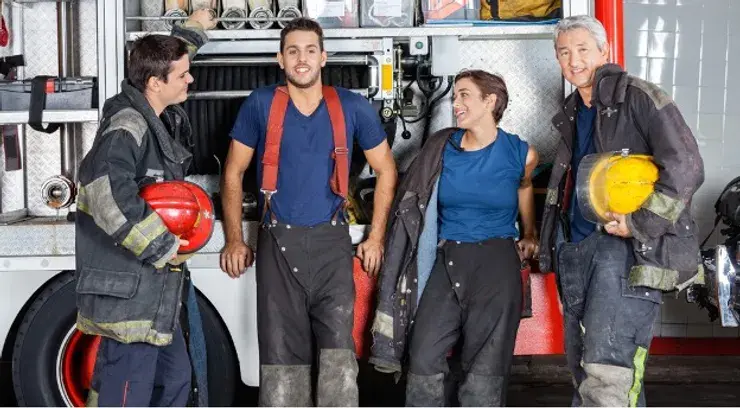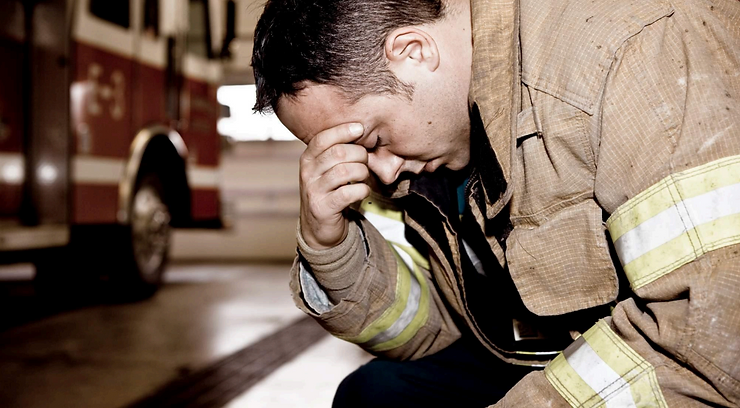
First responders courageously face the multiple dangers and challenges of protecting and serving our communities every day. The unique stressors experienced by first responders cannot be overstated, nor can the importance of their mental well-being.
But what efforts are being made to address the effects of these challenges on those who serve? How can we foster stronger connections within this community to improve mental health outcomes?
Together, we’ll delve into the pivotal realm of first responder peer support — a lifeline that goes beyond the uniform.
From understanding the challenges they face to exploring the positive impacts of peer connections, this article will provide valuable insights into the world of first responder peer support and its profound implications for the well-being of those who serve on the front lines.
Table of Contents
- What Is First Responder Peer Support?
- Common Issues Faced by First Responders and How Peer Support Can Help
- How Do First Responders Get Access To Peer Support Programs?
- Siento.io: Breaking the Barriers by Providing Peer Support To All First Responders
What Is First Responder Peer Support?
First responder peer support refers to an emotional well-being and mental health support system designed specifically for individuals working in the field of emergency services.
Peer support programs for first responders are rooted in the idea of peers supporting peers, acknowledging the unique challenges and stressors that come with the demanding nature of their work.
Some of the key components of first responder peer support may include:
- Confidentiality: First responders may be more likely to open up and seek help when they trust their conversations will remain private or anonymous.
- Education and awareness: Programs may include educational components that help raise awareness about mental health issues, reduce stigma, and promote a culture of seeking help when needed.
- Prevention and resilience: Peer support for first responders also aims to promote mental health resilience and prevent burnout by involving proactive measures to address stressors before they escalate.
- Community building: Fostering a sense of community and camaraderie among first responders by building a supportive network in and out of the workplace.
- Referral to professional services: While peers can provide valuable support, they’re not suitable for professional mental health services. Peer support programs are designed to complement, not replace, traditional mental health resources.
Given the nature of their work, first responders are often exposed to trauma, high stress levels, and challenging working conditions. Peer support programs for first responders recognize the importance of addressing the mental health and well-being of these individuals by providing a framework of support that understands and respects the unique aspects of their profession.

Who Needs First Responder Peer Support?
First responder peer support is designed to benefit a wide range of individuals within the first responder community. This includes those who work in professions where they are routinely exposed to challenging and potentially traumatic situations. The need for peer support extends to various roles within the emergency services sector.
These are the primary groups of professionals who can benefit from first responder peer support:
- Police Officers
- Firefighters
- Paramedics and Emergency Medical Technicians (EMTs)
- Dispatchers
- Search and Rescue Teams
- Corrections Officers
- Emergency Management Personnel
- Forensic Teams
- Disaster Response Teams
- Military First Responders
First responder peer support programs are inclusive and designed to meet the needs of these diverse roles within the emergency services sector. The overarching goal is to create a supportive community where individuals can share experiences, seek understanding, and access resources to address the unique challenges they face in their line of duty.
Why Is First Responder Peer Support Important?
First responder peer support is paramount due to the demanding nature of the roles undertaken by emergency service personnel. First responders frequently encounter traumatic situations and emotional strain as they navigate the complexities of their duties. One recent study found that firefighters are more likely to die of suicide than die on the job.
For reasons such as this, peer support programs play a crucial role in fostering a sense of community and understanding among first responders. By creating a network where colleagues can share experiences, challenges, and coping mechanisms, these programs contribute significantly to mental health and resilience.
The camaraderie established through peer support programs, like Siento, not only helps alleviate the psychological impact of the job but also provides a confidential and empathetic space for individuals to discuss their feelings and seek assistance.
Siento is dedicated to ending isolation and suffering through our first responder peer support platform. When first responders have the opportunity to connect anonymously with other first responders in the Siento community, they don’t have to feel alone in their struggles anymore.

Common Issues Faced by First Responders and How Peer Support Can Help
First responders face a range of hardships and burdens in their line of duty that can impact their mental health and well-being. Peer support plays a crucial role in addressing these challenges and providing the necessary assistance.
Here are some of the common issues faced by first responders and how peer support can help:
- Issue: Exposure to traumatic incidents, accidents, disasters, or violence can lead to emotional distress and post-traumatic stress.
- Peer support: Peers can provide immediate support after such incidents, offering a safe space to discuss feelings and reactions. Peer support helps normalize responses to trauma and encourages seeking professional help when needed.
- Issue: The nature of the job, including long hours, unpredictable schedules, and high-pressure situations, contributes to elevated stress levels.
- Peer support: Peers can share coping strategies for managing stress and help colleagues recognize signs of burnout. Peer support contributes to a culture of self-care and resilience within the first responder community.
- Issue: Continuous exposure to traumatic events over time can lead to cumulative stress, impacting mental and emotional well-being.
- Peer support: Peers understand the cumulative nature of stress in the profession. They can provide ongoing support, encourage mental health check-ins, and help identify early signs of distress.
Stigma Around Mental Health
- Issue: Stigma can discourage first responders from seeking help for mental health concerns due to concerns about judgment or perceived weakness.
- Peer support: Peers actively work to reduce stigma by fostering open conversations about mental health. They create an environment where seeking support is viewed as a sign of strength, not weakness.
Isolation and Loneliness
- Issue: The demanding nature of the job can lead to social isolation and feelings of loneliness, especially when dealing with challenging incidents.
- Peer support: Peers provide a sense of community and camaraderie. They offer a supportive network where individuals can share experiences, fostering a sense of belonging and connection.
Relationship Strain
- Issue: The stress of the job can affect personal relationships, leading to strain with family and friends.
- Peer support: Peers can share strategies for maintaining work-life balance, managing relationship challenges, and providing a supportive space for discussing personal issues.
Crisis Intervention
- Issue: First responders often find themselves in situations requiring immediate crisis intervention, which can be emotionally taxing.
- Peer support: Peers are trained to provide immediate support after critical incidents. They assist colleagues in processing emotions and guide them toward appropriate resources for further help.
Shift Work and Sleep Issues
- Issue: Irregular working hours, night shifts, and long hours can lead to sleep disturbances, impacting overall well-being.
- Peer support: Peers can share strategies for managing shift work, promoting healthy sleep habits, and provide practical tips for maintaining overall health.
Peer support programs can be instrumental in addressing these issues by creating a supportive culture within the first responder community.

How Do First Responders Get Access To Peer Support Programs?
Access to peer support programs for first responders is typically facilitated through a combination of organizational initiatives and external resources. Many emergency service agencies have recognized the importance of mental health and peer support, and as a result, they integrate these programs into their overall support infrastructure.
Within organizations, first responders can often access peer support through:
- Internal networks
- Counselling services; or
- Designated peer support teams
External organizations and non-profits specializing in mental health and well-being may collaborate with first responder agencies to offer supplementary peer support programs.
These external resources may include helplines, online platforms, or community-based initiatives specifically designed to provide a confidential and understanding environment for first responders facing stress, trauma, or emotional challenges.
First responders need to be aware of the available resources within their organization and community.
Peer support programs are most effective when individuals are:
- Informed
- Feel comfortable seeking help; and
- Have access to a supportive network
If a specific organization or department does not have a formalized peer support program, individuals can inquire about available mental health resources and explore external options for support.
What Are Some of the Barriers To Seeking Peer Support for First Responders?
Despite the importance of first responder peer support, several barriers can hinder individuals from seeking the help they need. These barriers are often rooted in a combination of organizational culture, societal perceptions, and personal factors.
Here are some common barriers to seeking first responder peer support:
- Stigma
- Cultural norms within the profession
- Fear of professional consequences
- Confidentiality concerns
- Lack of trust in the system
- Limited awareness
- Perceived weakness
- Coping strategies
- Time constraints
Addressing these barriers requires a comprehensive and empathetic approach, involving changes in organizational culture, education and awareness initiatives, and ongoing efforts to reduce stigma surrounding mental health within the first responder community.
Creating an environment where seeking support is encouraged, normalized, and met with understanding is crucial for breaking down these barriers.
Siento.io: Breaking the Barriers by Providing Peer Support To All First Responders
With so many barriers to seeking mental health support, it’s no wonder countless first responders suffer in silence.
At Siento, our goal is to end the mental health stigma with our mobile first responder peer support app. Built for first responders, just like you, who face barriers when seeking mental health and emotional well-being support.
Siento aims to end your feelings of isolation and loneliness, because the truth is, you’re not alone. With Siento, you can anonymously share your feelings and experiences with other first responders, all while keeping a personal history of your activity.
For more information about joining our first responder peer support community, click here.

The content in this blog is not intended to be a substitute for professional medical advice, diagnosis, or treatment. Always seek the advice of your physician or other qualified health provider with any questions you may have regarding a medical condition.








